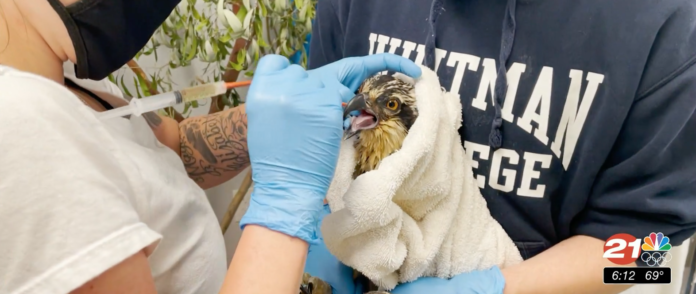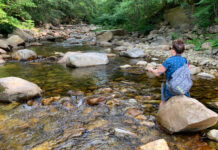Think Wild officials say legs were deeply bound by hay rope, likely from nest
BEND, Ore (KTVZ)– A pair of osprey fledglings were spotted falling from their nest after attempting to fly in Powell Butte almost two weeks ago. A concerned citizen brought them to Bend wildlife hospital Think Wild.
Think Wild Executive Director Sally Compton said the fledglings are being closely monitored after undergoing surgery to remove hay rope that had managed to grow through their skin.
Upon intake of the birds Think Wild veterinarian Dr. Laura Acevedo observed that the rope was deeply set into the birds’ legs, almost to the bone.
When asked how the hay rope found its way into the nest, Compton said Monday it’s very likely that the mother osprey wove the hay rope into the nest, amid other materials, and the chicks had grown with it binding their feet.
“The hay rope was pretty much entwined almost to the bone, and so we did have to do a surgery and give them quite a few medications. Right now, they’re having some nerve blockers, antibiotics and anti-inflammatories,” Compton said.
Compton said the fledglings are about two months old and need to be taught how to hunt and fly, skills they’d naturally be learning from their mother before migrating south for the winter.
“The injury appears to have caused developmental disabilities and a failure to thrive. Even after
surgery to remove the rope, the osprey cannot stand,” Compton said. “The pair continue to huddle together, as if
still connected, because they’ve never known anything else.”
Compton is unsure whether the birds will be suited to adjust to life in the wild at this time, but she says the best-case scenario is a smooth recovery and having the fledglings reunited with their mother. The worst-case scenario, she said, is that they may need to stay under care.
“Fortunately, the rescuer did let us know that the mother is still at the original nest, so we are really hoping we will be able to rehab and release these fledgling osprey and reunite them with their mother before she migrates,” Compton said.
For now, Compton is doing what she can to help the fledglings, and says luckily they have each other, so they can learn to hunt together.
“We are hand-feeding them cut-up fish. We also are hydrating them, giving them fluids.” Compton said. “Once they get a little bit older, we’re hoping to move them out to our large water fountain closure. This enclosure has a pond in it, so we can put live fish in there. They can learn how to hunt for fish before we put them back in the wild.”
Compton said the public can play a part to prevent situations like this in the future.
“Best thing you can do to prevent this injuries is to pick up after yourself, make sure you leave no trace,” she said. “Also, if you see any trash or any twine while you’re out and about on a hike, just pick it up and bring it with you.”
While Think Wild is dedicating time, energy and resources to nurture the osprey to better health, Compton notes that medical supplies and the daily supply of fresh fish are ongoing expenses, and donations would be helpful.
Think Wild urges citizens to remember that even small amounts of trash can be devastating to wildlife. Plastics and small pieces of rubber can be picked up by foraging birds who are unable to digest them, resulting in the blockage of their digestive tracts. Rope, twine, and fishing line can entangle birds, cause cuts or amputations to the wings, legs, feet, or neck. Even small amounts of oil or grease can damage a bird’s plumage, making it difficult for them to fly and regulate its body temperature.
Osprey are Oregon’s state raptor, and they are protected by both state and federal law. They can be found in Central Oregon in the spring and summer, where they nest and raise their young before migrating south for the fall and winter.
If you ever have any questions, Think Wild’s wildlife hotline, (541) 241-8680, is available seven days a week from 8 AM to 5 PM.
Credit: Source link































